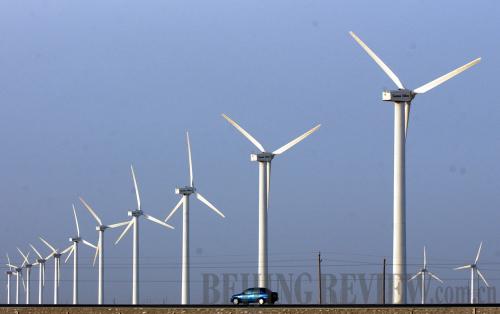|
 |
|
HARNESSING WIND: A car passes by a wind power-generating base in Jiuquan City, Gansu Province (ZHANG MENG) |
Efforts to curb carbon emissions continue to take shape as China adheres to its pledge for a brighter, greener future. More importantly, as environmental measures take hold and develop across the country, people's awareness of the need to reduce emissions continues to grow.
At the China-U.S. Low Carbon Economy Conference 2009 on September 23 in New York City, Xiong Yan, Chairman of the China Beijing Environment Exchange (CBEEX), outlined two environmental actions developing in China.
The first is a voluntary "carbon offset" program promoted by the Beijing Gardening and Greening Bureau, featuring the establishment of carbon offset service stations in airports, department stores and parks where residents can conveniently buy carbon offset credits. Through the program, car owners can buy "green drive" tags at 1,000 yuan ($146) valid for one year. The money will go to a green carbon fund, which will plant trees at the base of the Great Wall. The new service has been warmly received by environmentally friendly car owners, Xiong said.
Another development was the completion of the very first voluntary carbon emissions reduction trade in the country. The trade took place on August 5, 2009. Tianping Auto Insurance Co. Ltd. bought 8,026 tons of carbon emission quota that was saved thanks to the "green travel" campaign during the Beijing Olympic Games (August 8-24, 2008) to offset the company's carbon emissions from 2004 to 2008.
The individuals' awareness of voluntary carbon reduction is the result of the government's constant call for a low-carbon economy, Xiong said.
As a responsible developing country, China attaches great significance to issues related to climate change, Xie Zhenhua, Vice Minister of the National Development and Reform Commission (NDRC), said on November 26 at a press conference held by the State Council Information Office.
Xie said resource conservation and environment protection are basic national policies; to realize sustainable development should be a national strategy; and China will strive to conserve energy and reduce carbon emissions to cope with climate change.
According to NDRC figures, by June 30, 2009, Chinese energy use per unit of the GDP had decreased by 13.45 percent, or the equivalent to reducing 1 billion tons of carbon dioxide, compared to 2005 figures. Xie said this achievement is second to none in the world.
On November 25, the State Council pledged to reduce per-unit carbon dioxide emissions of GDP by 40-45 percent by 2020, compared to 2005 levels.
"It will take arduous endeavors to meet this goal, but China's determination to achieve this goal is steadfast. We will strive to take all policies, measures and actions needed to contribute to the mission of achieving sustainable growth while protecting the global climate," Xie said.
Top officials also indicate that China's future competence will rely on low-carbon and low-energy-consuming products.
Government's endeavors
Energy conservation, carbon reduction and coping with climate change will always remain an important part of China's future development plans, Xiong said.
| 